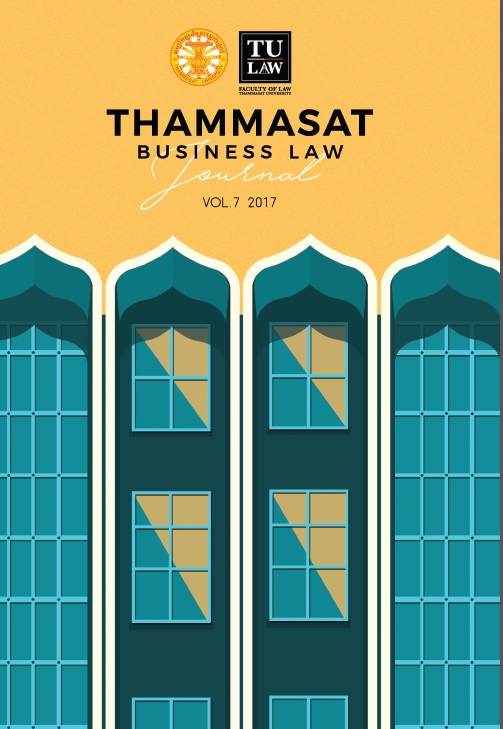CORPORATE CRIMINAL LIABILITY FOR BRIBERY OFFENCES: A COMPARATIVE STUDY OF THAI LAWS AND FOREIGN LAWS
Main Article Content
Abstract
Bribery is one of the most significant problems in the world that should be immediately solved as it causes harmful effects on business and society at large, weakens public accountability, democratic values, and undermines the rule of law. Nowadays, business operations are mostly done by corporations. Thus, it is not only individuals who commit bribery offences, but also corporations which cause much larger damages to economics and society, compared to the offences committed by individuals.
The United Nations Convention against Corruption or UNCAC is the first international legally binding anti-bribery instrument which had been negotiated by the members of the United Nations including 180 countries around the world and Thailand. Being a state party of UNCAC, Thailand has legal obligations to comply with its principles, including establishing corporate liability for involving in bribery offences which type of liability can be criminal, civil or administrative according to Article 26 of UNCAC concerning the liability of legal person.
According to the obligations under UNCAC, Thailand amended the Organic Act on Counter Corruption B.E. 2542 which established liability of a legal person for bribery offences. However, as shown in the Corruption Perception Index in recent years, a low score and ranking indicates severe corruption problem in Thailand which is still rising and unstoppable. The result can be interpreted that the recent law of Thailand concerning corporate criminal liability for bribery offences does not achieve its purpose of deterrence. Thus, it is necessary to seek other countermeasures which effectively deter bribery problems in Thailand.
This article will focus on criminal liability of juridical persons, especially the legal enforcement of corporate criminal liability and sanctions; it does not include criminal liabilities of natural persons representing the juridical persons.
A comparative study of Thai laws and foreign laws is chosen as a method to seek suitable guidelines for developing Thai laws. The United States, as the successful country in combating bribery problem due to high record of detected bribery cases under the Foreign Corrupt Practices Act 1977, the United Kingdom as the UK Bribery Act which is considered the strictest law on bribery offences internationally, and lastly, France, as a model of civil law countries which is the same juristic method as Thailand, are selected to be studied for their laws in order to seek suitable countermeasures for Thailand. This should play the significant role in developing the corporate criminal liability for corruption offences in the long run.
Article Details
References
Surasak Likasitwattanakul, Corporate Criminal Liability: The study to suggest juristic method for Thailand, a comparative study with UK and France, Faculty of law Thammasat University Journal, 2009.
Articles
Foreign Office of the National Anti-Corruption Commission, “Summary of the United Nations Convention Against Corruption 2003 (UNCAC), management issue, 2008.
Pokpong Chanwith, ‘Basic knowledge on Laws and Economics’, Academic essay for seminar, Thailand Court of Justice and Thailand Development Research Institute, 2010.
Pokpong Chanwith, ‘Economic Analysis of Criminal Laws’ 2nd edition, Thammasat University, The Thailand Research Fund (TRF), 2011.
Taweekiat Meenakanist, 'The complete research on corporate liability for involving in transnational crime'
Tilleke & Gibbins, 'Anti-Corruption Law in Thailand, A Practical Guide for Investors, 2016.
Uthit Sankosik, 'The purposes of punishment', 21st issue, Prosecutors Journal, 1996.
Other Materials
Department of Justice, Film Executive and Spouse Found Guilty of Paying Bribes to a Senior Thai Tourism Official to Obtain Lucrative Contracts (2009)
United Nations Office on Drugs and Crime, 'United Nations Convention Against Corruption Signature and Ratification Status (2016)
Stacey L. McGraw and Stacey E. Rufe, 'The Foreign Corrupt Practices Act: An Overview of the Law and Coverage-Related Issues' (2014)


